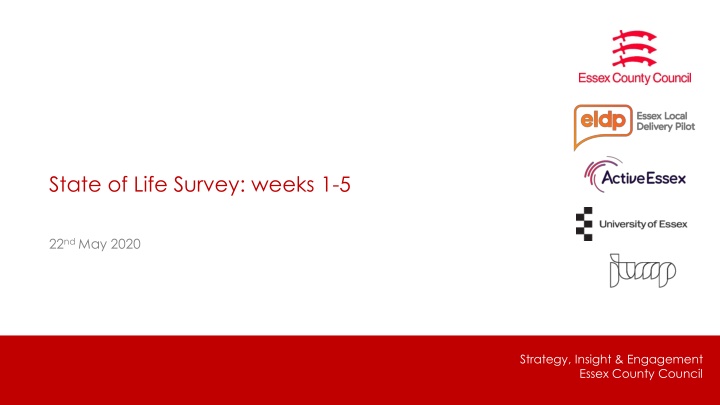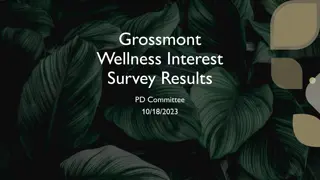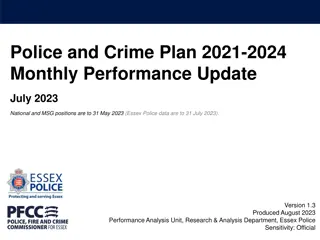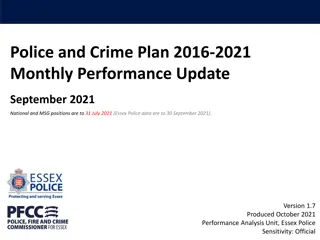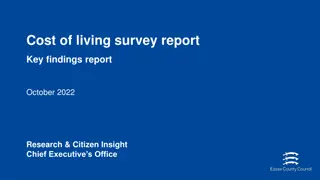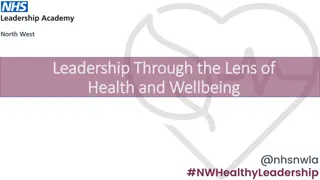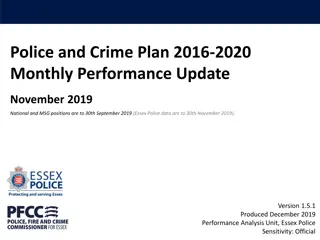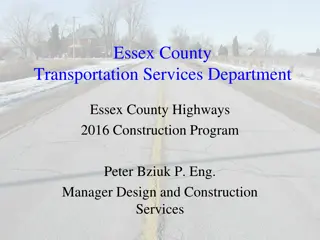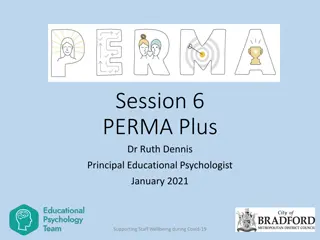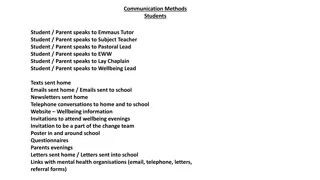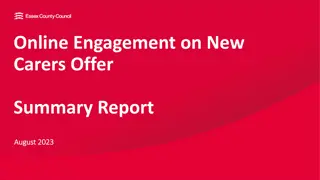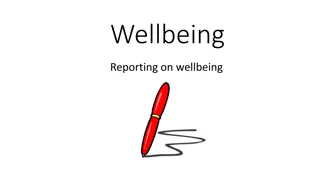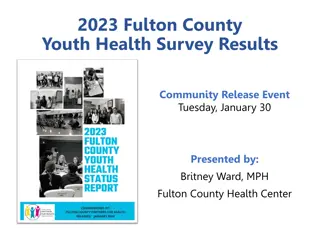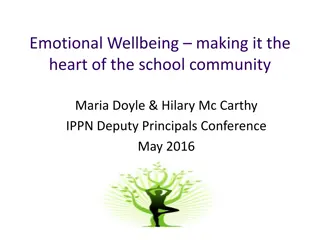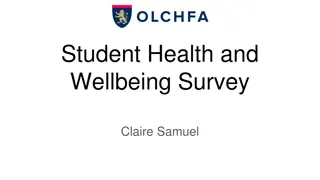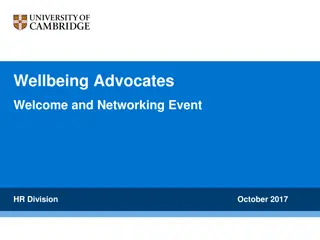State of Life Survey: Wellbeing Insights in Essex County During COVID-19
The State of Life Survey conducted in Essex County during the COVID-19 lockdown reveals the impact on residents' personal wellbeing, life satisfaction, happiness levels, and economic stability. Despite a decline in certain aspects, there have been observed improvements in recent weeks. Residents show resilience, but some experience decreased confidence and support networks. Trust in public bodies fluctuates, with an increase in volunteering efforts and ongoing threats to economic wellbeing. The survey offers valuable insights into the experiences and behaviors of Essex's population during this challenging time.
Download Presentation

Please find below an Image/Link to download the presentation.
The content on the website is provided AS IS for your information and personal use only. It may not be sold, licensed, or shared on other websites without obtaining consent from the author.If you encounter any issues during the download, it is possible that the publisher has removed the file from their server.
You are allowed to download the files provided on this website for personal or commercial use, subject to the condition that they are used lawfully. All files are the property of their respective owners.
The content on the website is provided AS IS for your information and personal use only. It may not be sold, licensed, or shared on other websites without obtaining consent from the author.
E N D
Presentation Transcript
State of Life Survey: weeks 1-5 22nd May 2020 Strategy, Insight & Engagement Essex County Council
Introduction Introduction Following the announcement of the COVID-19 lockdown on 23rd March, the University of Essex and Jump, working with the Essex Local Delivery Pilot (LDP) and ECC s Research and Insight team, launched the State of Life survey. The State of Life survey is web-based and distributed via social media channels. It is designed to gather key insights on wellbeing across Essex. This report summarises key findings up to week 5 of the survey being live w/c 13th April to w/c 11th May. As an online, social-media survey, the State of Life does not purport to be strictly representative of the whole-Essex population. Nevertheless, by tracking week on week changes in key metrics, we can gather insight into the experiences, views and behaviours of the Essex population. Please note: all baseline figures used were published before the COVID-19 pandemic began in order to establish a comparison between past and present. :
Key messages The current crisis is affecting residents personal wellbeing. Levels of life satisfaction and happiness have fallen below levels seen pre-COVID, although there has been an observed improvement in recent weeks. The proportion of residents reporting loneliness remains high (around 30% of respondents) and levels of physical activity, which had increased, appear to be returning to pre-COVID level. Personal Wellbeing The majority of Essex residents remain resilient, but increasing numbers are less confident and assured. While 90% remain confident they can deal with unexpected situations, the proportion who feel they cannot has increased to 8.5% (compared to 2.5% pre-COVID). We have observed effects on residents support networks: an increasing minority feel they could not rely on family and friends in the event of a significant problem. Resilience Essex residents trust in different public bodies has been changing throughout COVID outbreak. Trust in local councils appears to have increased above pre-COVID levels, while trust in Government appears to be decreasing as lockdown continues. Trust in neighbours continues to increase overall. Trust The pandemic has prompted a wave of spontaneous volunteering over 50% have volunteered in some way since the outbreak began. But there are signs that the lockdown may be reducing levels of volunteering overall. Levels of both formal and informal volunteering continue to be below pre-COVID baseline levels. Volunteering The outbreak continues to threaten the economic wellbeing of a significant minority of residents, with the proportion of those who are struggling financially remaining fairly constant throughout (c.20%). Fewer are feeling pessimistic about their financial future as weeks go by, but around three in ten expect to be financially worse of in twelve months time. Economic Wellbeing
Life satisfaction As the Coronavirus-related restrictions have continued, survey responses from residents across Essex suggest that: levels of life satisfaction amongst the general population are consistently below the pre- COVID baseline When asked to rate how satisfied they were with their life on a scale of 0 10, the average score given by respondents decreased from 6.2 in w/c 13th April to 5.9 in w/c 27th April. The average score returned to 6.2 in w/c 11th May, but this is still below the pre-COVID baseline (6.51). people are seeing things in their lives as less worthwhile, but scores now seem to be improving When asked to rate the extent to which they feel that the things in their life are worthwhile on a scale of 0-10, the average score given by respondents fell from 7.3 in w/c 13th April (a level consistent with the pre-COVID baseline), to 6.9 in w/c 27th April. However, the average score seems to be returning to the pre-COVID level, with an average score of 7.2 in w/c 11th May.
Happiness and loneliness happiness levels decreased over 4 weeks, but are now improving Respondents were asked to score how happy they felt the day before answering the survey. The average happiness score decreased across the first four weeks of the survey (6.3 in w/c 13th April and 5.9 in w/c 27th April). However, the average score increased to a level above the pre-COVID baseline in week 5, with an average score of 6.6. levels of loneliness seem to be decreasing, but are still much higher than pre-COVID levels When asked how often, if at all, they feel lonely, 26%of respondents said either some of the time or almost all of the time in w/c 13th April. A peak of 32.6% was observed in w/c 27th April but levels have since decreased to 30.5% in w/c 11th May. Even so, these figures are still much higher than the pre-COVID19 baseline of 23%.
Physical activity the proportion of people who are physically active has almost returned to pre-COVID levels Overall, respondent continue to report that they are doing more days of physical activity with the average number of days per week completing 30 minutes of physical activity increasing from 3.75 days pre-COVID to 4.08 days (0.33 days increase). The proportion of people who are physically active (150+ minutes a week) has increased overall since the start of the survey and the proportion of people who are physically inactive (<30 minutes a week) has decreased between weeks 2 and 5 of the survey. 61.4% report being physically active and 24.4% report being physically inactive, similar to baseline.
Personal resilience Despite the impact that the COVID-19 outbreak is having on life satisfaction, happiness and loneliness, the vast majority of Essex residents remain resilient. Based on responses to questions designed to test levels of personal resilience the survey suggests that: The majority of Essex residents remain confident in their ability to deal with unexpected events, but there has been an increase in those who are not Overall, 91.0% of people in w/c 11th May agree that [they] would be able to deal efficiently with unexpected events , which is consistent with previous weeks and the pre-COVID baseline. However, the proportion of people who feel that they could not at all deal with unexpected events has increased consistently since w/c 20th April (1.2%) to w/c 11th May (8.5%), higher than the pre-COVID baseline of 2.5%. The vast majority remain confident that they can handle whatever comes their way, but there has been an increase in those who feel they cannot Overall, 93.5% of respondents in w/c 11th May agree that [they] can usually handle whatever comes [their] way , which is consistent with previous weeks. However, the proportion of those who feel that they could not has increased since w/c 27th April to 6.5% in w/c 11th May, which is above the pre-COVID baseline (1.5%).
Reliance on family and friends Although the majority of residents feel a sense of personal resilience, there are some early signs that the COVID pandemic may be placing pressure upon, and exposing limitations within support networks. the proportion of respondents who report that they could only rely on their friends and family to a limited degree if they had a serious problem has remained consistent since week 2 The percentage who felt they could rely on their immediate family only a little or not at all has remained fairly constant from 16.6% in w/c 20th April to 16.8% in w/c 4th May. This is higher than the national pre-COVID baseline of 15.9%, however this proportion dipped below the baseline in w/c 11th May (15%). The proportion who felt they could rely on friends only a little or not at all increased from 21.1% in w/c 13th April to 27.4% in w/c 20th April. This figure has decreased over weeks 3, 4 and 5 of the survey (24% in w/c 11th May), but still compares unfavourably to the national pre-COVID baseline of 20.2%. although small, the percentage of residents who can rely on neither family nor friends, appears to be increasing. The percentage who felt they could rely on neither family nor friends increased from 6.6% in w/c 13th April to 10.5% in w/c 11th May.
Trust Essex residents trust in their neighbours have increased overall since the start of the survey. Trust in public bodies appears to be fluctuating throughout the COVID outbreak and lockdown, but levels of trust in the local council has recently increased above pre-COVID levels. Responses to the survey suggest that people may be becoming more trusting of: Local council: 48% reported trust in the local council in w/c 13th April. This increased to 69.9% in w/c 11th May, which takes current levels of trust to be above the pre-COVID baseline (62.5%). their neighbours: despite a decrease between weeks 1 and 2 of the survey, respondents trust in their neighbours has remained higher than the pre-COVID baseline (54.1%). Trust has even increased overall, reaching a peak of 71% in w/c 4th May. Trust in the Government has remained higher than the pre-COVID baseline (20.9%), but has fluctuated throughout and a considerable overall decrease has been observed between w/c 13th April (57%) to w/c 11th May (48%).
Volunteering Although the pandemic has prompted a wave of volunteering principally to support the NHS and other public agencies emergency response there are signs that the pandemic and lockdown may be reducing levels of volunteering overall. There is some evidence of impacts on both formal and informal volunteering: overall, the proportion of respondents who have formally volunteered during the COVID-19 outbreak has remained consistently below the pre-COVID baseline (32%), with less than a quarter of all respondents reporting that they have formally volunteered during the outbreak (24%). This could be particularly concerning as those responding to the survey were more likely than average to have formally volunteered in the last 12 months. overall, nearly 30% of respondents (29.2%)have informally volunteered during the COVID-19 outbreak. Whilst this proportion has increased overall since the survey has been live, it is still considerably lower than the national pre-COVID baseline (52%). This may be a function of reduced opportunities for volunteering during lockdown. It does however, raise questions about the extent to which the large number of people who have spontaneously volunteered are new volunteers or whether many of these would be volunteering in other areas under different circumstances
COVID-19 Volunteering Over half of all respondents have volunteered in some form in response to the COVID-19 pandemic. The proportion of respondents who have volunteered during the COVID-19 pandemic (either formally or informally) has remained fairly constant since the survey has been live (53%). However, these figures are still around 9.5% lower than national baseline figures, which states that 62.5% of people nationally have volunteered in some way within a 12 month period. The most common voluntary activities have been giving informal help to friends and neighbours (29.2%). Overall, 7% have signed up to support the NHS and 16.9% have signed up to help in a local community group.
Financial wellbeing The Coronavirus outbreak is impacting on Essex residents economic wellbeing. Survey responses from residents across Essex suggest that: more people are struggling to get by financially. The proportion of respondents who say they are just about getting by or finding it difficult financially has increased overall since the survey has been live, with 18.7% of people in w/c 13th April struggling financially and 19.5% in w/c 11th May. This level of response is consistent with national polling. many are still pessimistic about their future prosperity, but the proportion is decreasing Overall, around a third of all residents (32.7%) reported that they believe they will be financially worse off one year from now. However, the overall proportion is continuing to decrease over the weeks the survey has been live, from 36.6% in week 1 to 29.1% in week 5.
Changes in working pattern The majority of employed residents are still working from home. Of all those who are employed, 72.8% reported to be working from home, and this proportion has remained fairly consistent throughout the weeks the survey has been live. It is expected that these levels will decrease over the coming weeks and months as employees are able to return to their normal place of work.
Source and contacts State of Life Survey COVID-19, 2020 tracker Created by: Jump Projects LTD & Reason Digital Supported by: Active Essex & University of Essex Found at: https://www.stateoflife.org/2020tracker Baseline sources: Active Lives Survey (Sport England) Community Life Survey EuroBarometer LDP Baseline Dataset (Essex Local Delivery Pilot, ECC) Understanding Society This briefing report was produced by Essex County Council s Strategy, Insight and Engagement function. For more information or questions, please contact: Hannah Taylor, Senior Researcher hannah.taylor@essex..gov.uk Katy Bennett, Analyst katy.bennett@essex.gov.uk
